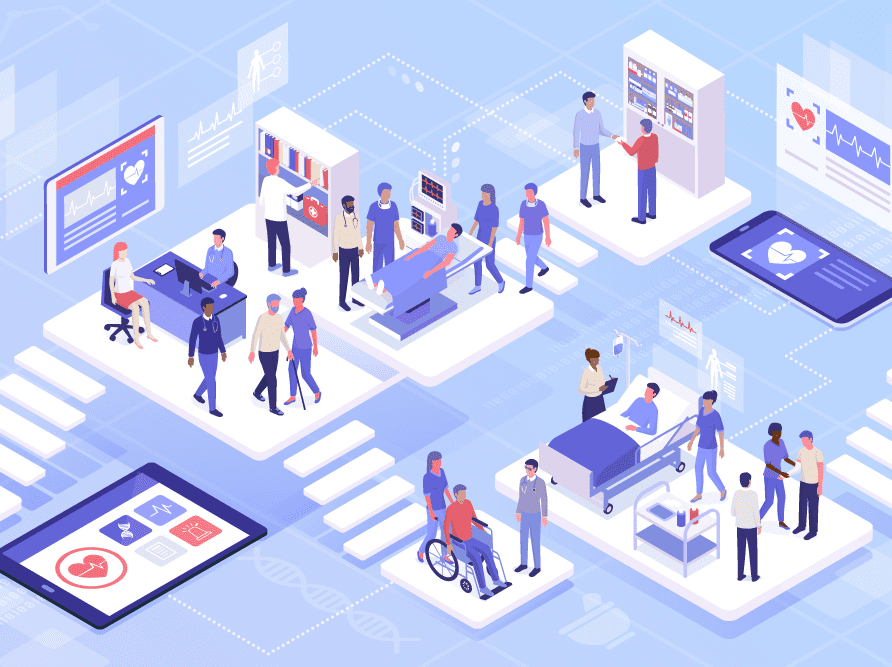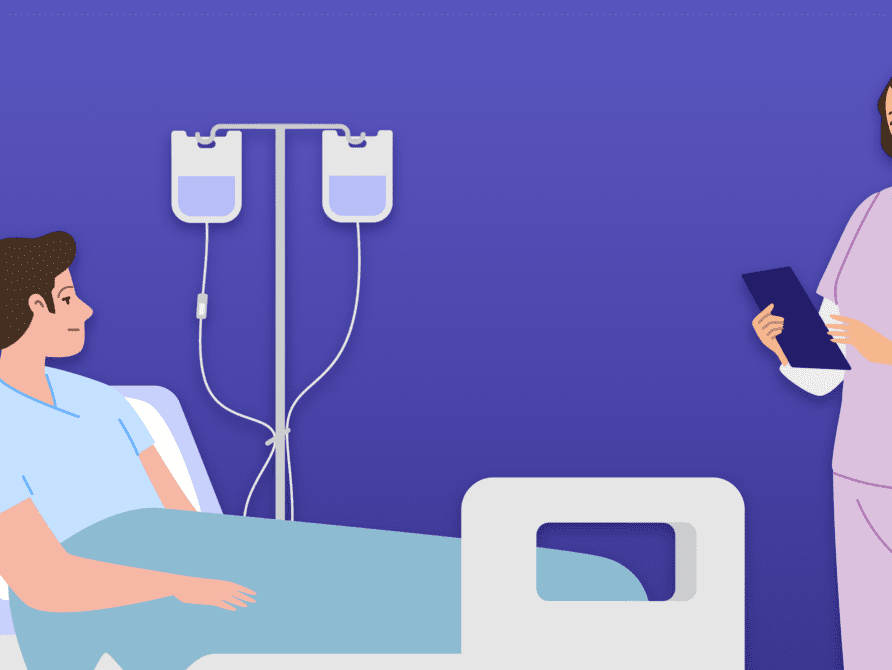INSIGHTS
Through configuring its Sunrise™ EPR to meet the trusts specific needs, the trust is already reaping the benefits. By configuring an electronic patient list in the Acute Medical Department, the trust has enabled a 19% reduction in length of stay for patients, equalling £3m+ projected annual savings.
Continuing a successful journey
Recognising the benefits that digitisation can provide to operational efficiency, patient care and experience, the trust set the goal of digitising the entire patient journey from the Emergency Department (ED) through to community services.
Like many trusts, Bolton operates at heightened capacity which is putting pressure on all areas of the service. As such, there is greater demand for patients to move swiftly through the system to reduce delays in ward transfers and discharges.
Before the implementation of Sunrise™ EPR, staff in ED relied on paper systems, facing issues like missing charts, illegible writing, duplicated data entry, and incomplete medical history. Administrative tasks were time-consuming, potentially leading to delayed ward transfers and discharges, longer hospital stays and reduced patient satisfaction.
Taking a phased approach to EPR deployment, the system was configured to the specific needs of ED, transforming these time consuming processes and improving patient flow.
Improved operational efficiency, patient care and expertise
Transformed time consuming processes
Improved patient flow
Flexible approach to training
Successful implementation hinged on a meticulous training programme, offering diverse options for different learning preferences. Group training sessions, online modules, one-to-one sessions and video guides were offered. Louise Clarkson, Chief Nursing Information Officer, stressed the importance of flexibility and convenience. She stated: "The team wanted to provide different training options as people learn in different ways. ED is very fast-paced and some staff were very worried about switching to an EPR, so we paired them with a clinical digital nurse, and the digital education team until they became confident with the system - which they did very quickly."
Altera Digital Health worked with Bolton to identify superusers, including specialty leads, ensuring thorough clinical input during the go-live phase. This meant that robust support was also available to clinical teams throughout the critical go-live and bedding-in periods. There were digital educators, configuration analysts, and informatics nurses in the department to provide support on the clinical ED areas for the first week of go live, hosting team meetings on every shift between the ED and Informatics leads and project managers. Key staff were always present to review reported issues, minimising disruptions to clinical workflows and patient care.
Reflecting on the success, Louise said: “This is something the team definitely got right. The response to the go-lives has been overwhelmingly positive. We put in good levels of support; almost everywhere you looked across all ED areas there was someone you could ask for help. We now complete this style of go live within all areas of the trust."
Minimising patient impact
The involvement of clinical staff within the digital team was crucial during the ED go-live. Viv Quirke, Senior Informatics Nurse at Bolton, emphasised the importance of this approach for both patient experience and technical reasons within ED. “Being admitted to an emergency department is often very scary for a patient. We wanted patients to be unaffected by the implementation. In high stress situations, we made sure our informatics nurses were on hand to provide support to ensure patient privacy and confidentiality.”
Digital nurses and the wider informatics teams assisted ED staff with EPR use, with any system issues effectively communicated to Altera developers when necessary.
“Our Informatics teams were always available, picking up any incidents that were logged. Issues were triaged and resolved immediately when necessary. Due to the fast-paced and critical nature of ED, most issues were identified and resolved within 24-hours.”
Viv Quirke
Senior Informatics Nurse
The trust has since established a Governance Forums within ED as well as trust-wide, so any new issues relating to EPR documents can be discussed and a solution agreed that is implemented service-wide in accordance with the trust’s change process.
Tailored functionality
The feedback-loop during each go-live is indicative of the trusts approach of tailoring Sunrise™ EPR to meet the specific departmental needs. Bolton and the Altera team worked closely together to tailor the system appropriately, such as consolidating all triage documents into a single digital form.
Louise explains: “What we’ve got is very bespoke. It doesn’t force our staff to change their workflows to fit the system; the system has been modified to meet their specific needs.”
The trust is looking at further improvements, including assessing it from an accessibility standpoint. Louise explains: “We are working closely with our disability forums to understand what our staff might need and what the system can do to better support them. Altera has already been very responsive regarding colour changes, for example. Our ambition is to make the system fully inclusive so anyone using our systems is supported.”
Data-led decision-making
The trust is experiencing tangible benefits from the EPR deployment, enabling a data-led approach to service improvements. Louise highlighted:
“Since going live in ED, we have full oversight of the patient journey from front door to back door, helping us identify and address bottlenecks to ensure swift treatment and patient discharge.”
Louise Clarkson
Chief Nursing Information Officer
The trust is seeking to improve discharges by automating discharge letters. Louise explained: “We’re taking a holistic approach, improving offline processes in conjunction with digital pathways, such as streamlining transport bookings to prevent unnecessary hospital stays and enhance patient satisfaction.”
We are able to access one version of the truth, so all teams understand the patient journey in real time. This actively makes a difference to the teams reviewing patients on the day to help reduce delays and reduce the patient’s length of stay.
Improved safeguarding
Bolton has significantly improved safeguarding for both adults and children in ED as a result of the EPR. Clinical staff are prompted to complete risk assessments on arrival, immediately flagging risks, such as falls or pressure sores. Viv noted: “Previously, it wasn’t always possible to fill in the forms promptly during busy times. Now, they are completed right away, enabling better patient monitoring and ensuring the right interventions are in place, such as placing at risk patients in visible bays, using specialist mattresses, and enabling safeguard teams to trigger referrals directly from the electronic documentation.”
Access to real-time information also enhances accuracy and efficiency in communicating information to Social Services. Viv explained: “The trust often receives calls from Children’s Social Services asking for information about why a child was admitted to ED over the weekend. Now it is much easier to report what has happened overnight, and our 0-19 services managing safeguarding concerns can access up to date information on ED attendances to inform Child Protection Plans and plan care more effectively.”
Integrating mental health services
Bolton is looking to further maximise benefits for staff and patients. It is already working on improving coordination between ED, mental health services and police services to put coordinated systems in place for scenarios in which a patient absconds. This includes ensuring that all parties are operating using the same RAG risk rating so that if police are called because a high risk patient has absconded, it will meet the police force’s patient high risk threshold and trigger the appropriate response.
Louise said: “We have had a really positive response from working with Greater Manchester Police and Greater Manchester Mental Health NHS FT (GMMH). We are now looking at ways that we can integrate with GMMH to improve timely access to data and continue improving patient safety.”
A fully digital patient pathway
Following the ED go live, Sunrise™ is now live across 50% of the trust and is preparing to roll-out across its community care sites, enlisting the support of the digital team and appointing community champions to provide a fully digital pathway of care.
Louise said: “By engaging with the team early, and making sure they have the right forums to speak up, we can hopefully mirror the success we have achieved in ED and across our hospitals, fully digitise the patient care pathway, the systems should be clinically led and reflect our dedication to efficient, patient-centred care.”
About the Client:
Bolton NHS Foundation Trust
Bolton NHS Foundation Trust implemented the Altera Sunrise Electronic Patient Record in October 2019, with the ambition to provide a full EPR as quickly and effectively as possible. While some trusts select a slower, more modular implementation, Bolton opted for the full suite, rolling out all modules to all inpatient departments in a single activation.
Related Insights
Article
Optimize your operations, optimize your outcomes
Shanna DeLeo
Article
Bird flu: Here’s what you need to know
Dr. Laura Kohlhagen
Article
HCTC: Connection, and client-first collaboration
Marcus Perez
Article
Analytics in 2024: Making the most sense out of your data
Shawn Widenhofer
Article
Article
Article
Millennial matters in medicine
Ben Scharfe
Article
Article
Budget-friendly ways to improve your cybersecurity
Brian Montgomery
Article
Article












